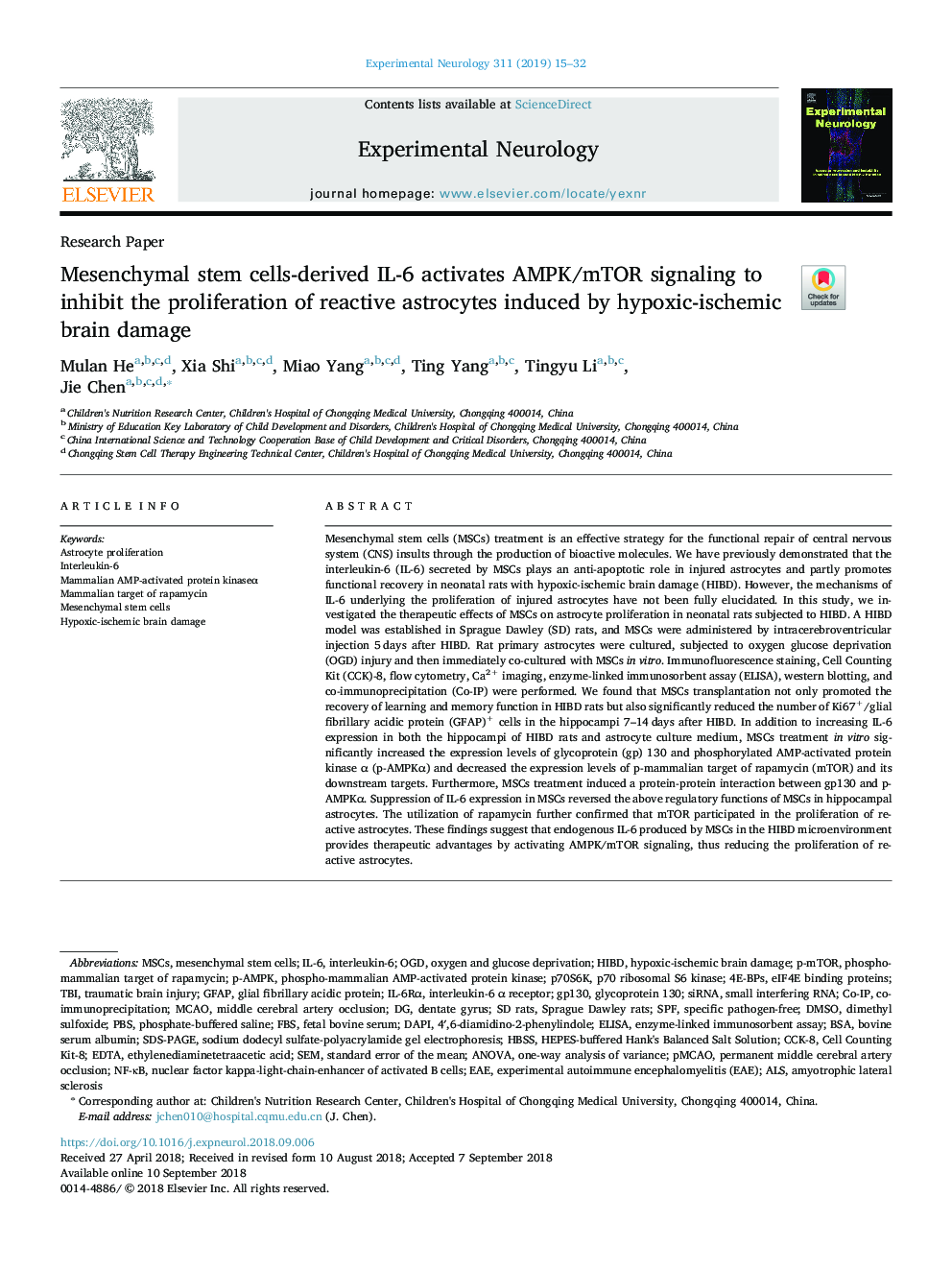| کد مقاله | کد نشریه | سال انتشار | مقاله انگلیسی | نسخه تمام متن |
|---|---|---|---|---|
| 10215436 | 1678522 | 2019 | 18 صفحه PDF | دانلود رایگان |
عنوان انگلیسی مقاله ISI
Mesenchymal stem cells-derived IL-6 activates AMPK/mTOR signaling to inhibit the proliferation of reactive astrocytes induced by hypoxic-ischemic brain damage
دانلود مقاله + سفارش ترجمه
دانلود مقاله ISI انگلیسی
رایگان برای ایرانیان
موضوعات مرتبط
علوم زیستی و بیوفناوری
علم عصب شناسی
عصب شناسی
پیش نمایش صفحه اول مقاله

چکیده انگلیسی
Mesenchymal stem cells (MSCs) treatment is an effective strategy for the functional repair of central nervous system (CNS) insults through the production of bioactive molecules. We have previously demonstrated that the interleukin-6 (IL-6) secreted by MSCs plays an anti-apoptotic role in injured astrocytes and partly promotes functional recovery in neonatal rats with hypoxic-ischemic brain damage (HIBD). However, the mechanisms of IL-6 underlying the proliferation of injured astrocytes have not been fully elucidated. In this study, we investigated the therapeutic effects of MSCs on astrocyte proliferation in neonatal rats subjected to HIBD. A HIBD model was established in Sprague Dawley (SD) rats, and MSCs were administered by intracerebroventricular injection 5â¯days after HIBD. Rat primary astrocytes were cultured, subjected to oxygen glucose deprivation (OGD) injury and then immediately co-cultured with MSCs in vitro. Immunofluorescence staining, Cell Counting Kit (CCK)-8, flow cytometry, Ca2+ imaging, enzyme-linked immunosorbent assay (ELISA), western blotting, and co-immunoprecipitation (Co-IP) were performed. We found that MSCs transplantation not only promoted the recovery of learning and memory function in HIBD rats but also significantly reduced the number of Ki67+/glial fibrillary acidic protein (GFAP)+ cells in the hippocampi 7-14â¯days after HIBD. In addition to increasing IL-6 expression in both the hippocampi of HIBD rats and astrocyte culture medium, MSCs treatment in vitro significantly increased the expression levels of glycoprotein (gp) 130 and phosphorylated AMP-activated protein kinase α (p-AMPKα) and decreased the expression levels of p-mammalian target of rapamycin (mTOR) and its downstream targets. Furthermore, MSCs treatment induced a protein-protein interaction between gp130 and p-AMPKα. Suppression of IL-6 expression in MSCs reversed the above regulatory functions of MSCs in hippocampal astrocytes. The utilization of rapamycin further confirmed that mTOR participated in the proliferation of reactive astrocytes. These findings suggest that endogenous IL-6 produced by MSCs in the HIBD microenvironment provides therapeutic advantages by activating AMPK/mTOR signaling, thus reducing the proliferation of reactive astrocytes.
ناشر
Database: Elsevier - ScienceDirect (ساینس دایرکت)
Journal: Experimental Neurology - Volume 311, January 2019, Pages 15-32
Journal: Experimental Neurology - Volume 311, January 2019, Pages 15-32
نویسندگان
Mulan He, Xia Shi, Miao Yang, Ting Yang, Tingyu Li, Jie Chen,